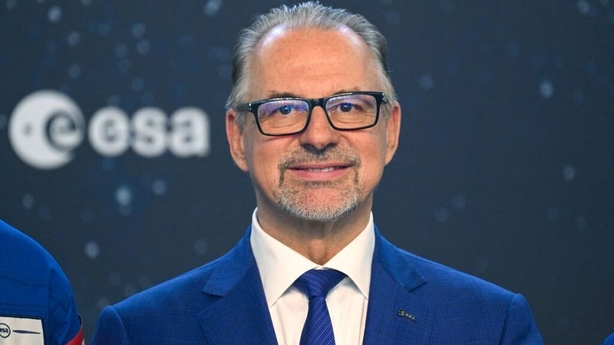Europe's top space official has urged wavering politicians not to abandon European leadership in combatting climate change, saying record heatwaves and vegetation fires provide "really alarming" evidence of the pace of global warming.
"It is clear that climate change is very visible and is really causing enormous changes to our planet," Josef Aschbacher, Director General of the European Space Agency (ESA) and a leading expert on environmental observation, said.
Greece, Italy, Spain and most recently Portugal have grappled with record-breaking temperatures and wildfires this summer.
The World Meterological Organization said that July had the highest global average temperature for any month on record.
"This is really alarming," Mr Aschbacher said.
"It just confirms that climate change is the biggest threat to our planet, to humankind, and will remain so for the next decades and we do need to do everything we can to mitigate the effects."
Until 2021, when he stepped up to run the 22-nation agency, Mr Aschbacher oversaw ESA's flagship Earth observation satellite activities including Copernicus, which the Paris-based agency says is the world's largest environmental monitoring effort.
ESA last week released a Copernicus image of a wildfire that razed thousands of hectares of forest in southern Portugal - a blaze that has since been brought under control.
Scientists say climate change is making heatwaves more frequent, intense and likely to happen across seasons, not just in what were regarded as the summer months.
But pressure is growing on some governments over the cost of net-zero commitments on emissions, and analysts say looming elections in Europe could put future measures at risk.
In the UK, where general elections are scheduled within 18 months, Prime Mininster Rishi Sunak has warned of climate policies that "unnecessarily give people more hassle and more costs".
Mr Ashbacher said long-term costs were likely to be far higher unless governments respond to "crystal clear" evidence, including satellite measurements, of the recent heat emergency in southern Europe.
"Acting now is much cheaper than waiting for years and then patching up the damage that has been caused," he said when asked if he saw any signs of drift in Europe's climate agenda.
"So yes, the alarm bells should still be ringing very loud. And it is certainly concerning if the signals are not heard in politics as they should be heard, in order to really save our planet."
He did not single out specific politicians or states.
Mr Aschbacher is among the most senior climate-monitoring officials to voice concerns over wavering support for measures to combat climate change - a creeping negative reaction that some climate activists have labelled "greenlash".
After scientists declared July the world's hottest month on record, United Nations Secretary-General Antonio Guterres said "the era of global boiling has arrived".

ESA's Copernicus programme involves six families of Sentinel satellites designed to read the planet's "vital signs" from carbon dioxide to wave height or land and ocean temperatures.
Plans for six more "Sentinel Expansion" missions starting from 2026 are in flux because of a funding gap of €721 million, stemming mainly from the partial loss of UK contributions following its exit from the European Union.
Negotiations have been under way for months over whether and to what extent Britain should continue to contribute funds to Copernicus via the EU, which co-leads the satellite programme alongside ESA.
The UK's smaller direct contribution to Copernicus as one of the core member nations of ESA itself is unaffected.
Although it is not part of the talks, Mr Aschbacher said ESA needs a funding decision by June 2024 "to continue development of the next set of Sentinel satellites in an uninterrupted way".
Failure to meet that deadline would kick the funding decision into the next planning period from 2028, he said.
Suspending work on the next round of satellites would also drive up costs by damaging continuity and send the wrong message about Europe's leadership on climate issues, Mr Aschbacher added.
"The impact would be very significant because the Sentinels are required in order to provide a number of critical climate parameters. This would significantly impact Europe's commitment to combating climate change."


